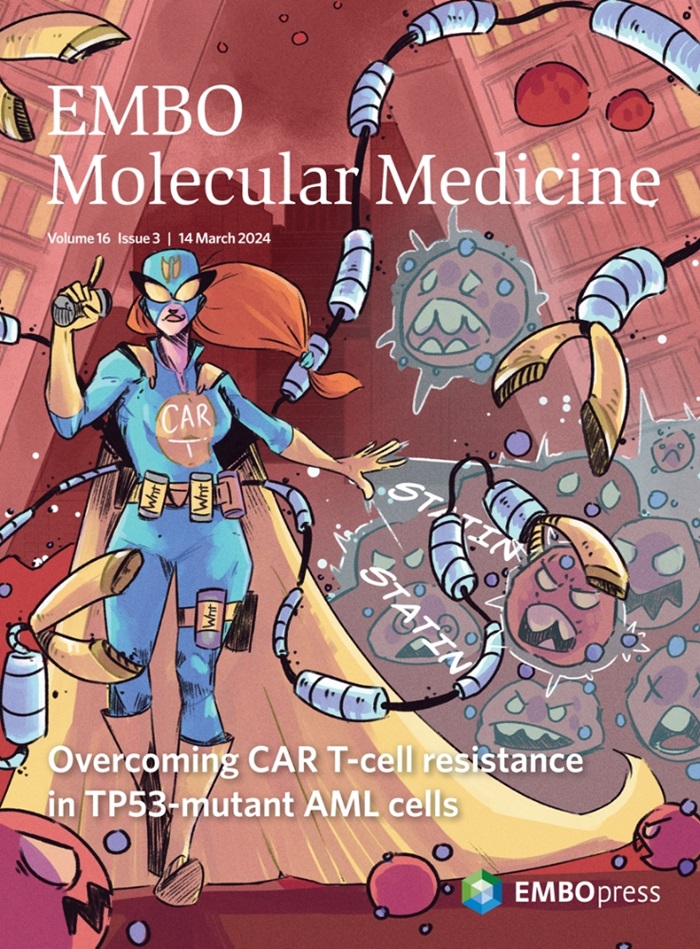Restricting SLC7A5-mediated Leucine uptake in T cells prevents acute GVHD and maintains GVT response.
IF 8.3
1区 医学
Q1 MEDICINE, RESEARCH & EXPERIMENTAL
引用次数: 0
Abstract
The L-Leu amino acid transporter SLC7A5 has become an important target in inflammation and cancer. However, its role in acute graft-versus-host disease (aGVHD) and graft versus tumor (GVT) remains unexplored. We demonstrate that SLC7A5 deletion affected T cell activation, expansion and survival, and reduced IFNγ and granzyme B expression, thus controlling aGVHD, but without effect on tumor growth. On the other hand, dietary restriction of L-Leu reduced aGVHD by controlling T cell expansion, inducing apoptosis, and affecting granzyme B secretion. However, CD8 T cells did not fail to activate and express IFNγ in the absence of L-Leu, and showed an increased proportion of central memory T cells, which contributed to the GVT response. Deletion of SLC7A5 in T cells compromises mTORC1, glycolysis and mitochondrial oxidation. On the contrary, L-Leu removal reduced mTORC1 and completely blocked glycolysis but preserved mitochondrial function, favoring the generation of central memory responses and expression of stemness marker TCF1. In addition, our metabolomics data underscores the L-Leu-derived metabolite β-hydroxybutyrate as an important marker for SLC7A5-dependent allogenic T cell expansion in aGVHD.在T细胞中限制slc7a5介导的亮氨酸摄取可预防急性GVHD并维持GVT反应。
l -亮氨酸转运体SLC7A5已成为炎症和癌症的重要靶点。然而,其在急性移植物抗宿主病(aGVHD)和移植物抗肿瘤(GVT)中的作用仍未被探索。我们证明SLC7A5缺失影响T细胞的活化、扩增和存活,降低IFNγ和颗粒酶B的表达,从而控制aGVHD,但对肿瘤生长没有影响。另一方面,饮食限制L-Leu通过控制T细胞扩增、诱导细胞凋亡和影响颗粒酶B分泌来降低aGVHD。然而,在缺乏L-Leu的情况下,CD8 T细胞并没有无法激活和表达IFNγ,并且显示出增加的中枢记忆T细胞比例,这有助于GVT反应。T细胞中SLC7A5的缺失会损害mTORC1、糖酵解和线粒体氧化。相反,L-Leu的去除降低了mTORC1,完全阻断了糖酵解,但保留了线粒体功能,有利于中枢记忆反应的产生和茎秆标记物TCF1的表达。此外,我们的代谢组学数据强调l - leu衍生的代谢物β-羟基丁酸盐是aGVHD中slc7a5依赖性同种异体T细胞扩增的重要标记物。
本文章由计算机程序翻译,如有差异,请以英文原文为准。
求助全文
约1分钟内获得全文
求助全文
来源期刊

EMBO Molecular Medicine
医学-医学:研究与实验
CiteScore
17.70
自引率
0.90%
发文量
105
审稿时长
4-8 weeks
期刊介绍:
EMBO Molecular Medicine is an open access journal in the field of experimental medicine, dedicated to science at the interface between clinical research and basic life sciences. In addition to human data, we welcome original studies performed in cells and/or animals provided they demonstrate human disease relevance.
To enhance and better specify our commitment to precision medicine, we have expanded the scope of EMM and call for contributions in the following fields:
Environmental health and medicine, in particular studies in the field of environmental medicine in its functional and mechanistic aspects (exposome studies, toxicology, biomarkers, modeling, and intervention).
Clinical studies and case reports - Human clinical studies providing decisive clues how to control a given disease (epidemiological, pathophysiological, therapeutic, and vaccine studies). Case reports supporting hypothesis-driven research on the disease.
Biomedical technologies - Studies that present innovative materials, tools, devices, and technologies with direct translational potential and applicability (imaging technologies, drug delivery systems, tissue engineering, and AI)
 求助内容:
求助内容: 应助结果提醒方式:
应助结果提醒方式:


